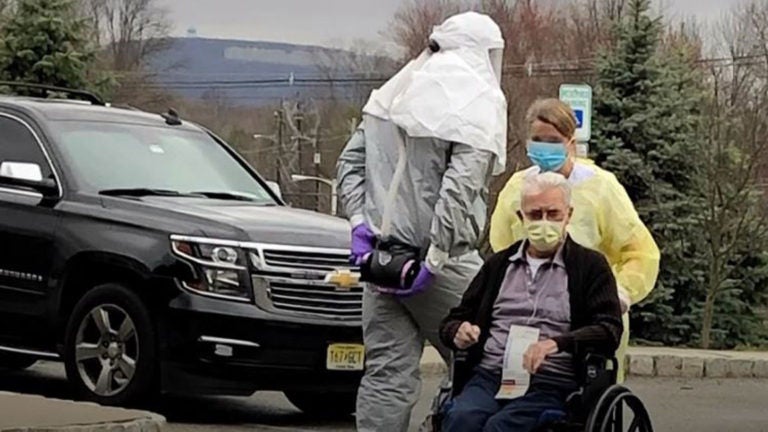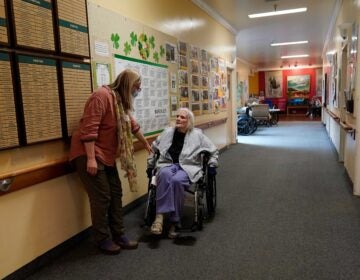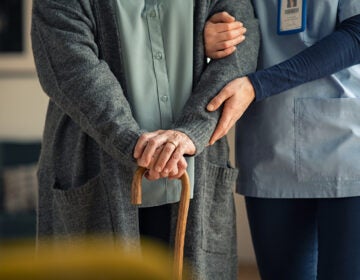N.J. plans for regional nursing homes to accept sick residents, staff
With COVID-19 patients at half of the state’s eldercare facilities, and shortages of staff, PPE endemic, regional cohorts could help slow spread of infection.

Patients from St. Joseph’s Senior Home in Woodbridge were evacuated March 25 after multiple residents contracted COVID-19 and some died. (NJTV News)
This story originally appeared on NJ Spotlight.
With the coronavirus taking a growing toll on New Jersey’s nursing homes, state officials are now stepping up their response and creating regional plans to group residents and staff at certain facilities to reduce the pandemic’s spread.
Half of the state’s 375 nursing homes now have at least one patient diagnosed with COVID-19, and some facilities have said they no longer have sufficient staff or other resources to safely care for their vulnerable residents, health officials announced Tuesday. These facilities serve elderly individuals with certain medical needs and patients discharged from hospitals who require treatment that can’t be provided at home.
“Our long-term care facilities continue to be severely impacted” by COVID-19, Department of Health Commissioner Judith Persichilli said at the state’s daily media briefing on the disease, which has now been found in more than 44,000 New Jerseyans, including more than 1,200 who have died. One in 10 of these fatalities involve a nursing home resident, she said.
Taking on more COVID-19 cases
Nursing home operators have already begun to assess which facilities have the staff, supplies, physical layout and other resources needed to take additional COVID-19 patients, according to Jon Dolan, president and CEO of the Health Care Association of New Jersey, which represents long-term care providers.
Dolan called the state’s approach “very solid,” adding, “it’s the right balance for us to strike,” to have facilities dedicated to residents that have tested positive, and others to provide care for those who have not. He expects up to 10 homes could soon be COVID-only locations.
But like hospitals and other health care providers, Dolan said his members are struggling to obtain enough personal protective equipment, or PPE — masks, gowns and other gear to protect against infection — or staff to do the job.
We’ve been challenged by staff (shortages) in the past and it’s doubly hard now,” he said. “We are the next front in this battle and we need to keep people safe and working.”
Computer modeling to get ahead of COVID-19
Persichilli said the regional cohorting plan calls for developing a computer model to sort patients and staff based on any COVID-19 test results, the existence of any respiratory symptoms, their known exposure to the virus, the presence of other positive cases at the facility and its physical design, or how much it allows for those infected to be kept separate. Residents and staff will then be moved to other sites, as needed, in an effort to isolate those with the disease from those without.
“The algorithm is a little deep, but we think we can do it. Actually we must do it,” Persichilli said Tuesday. COVID-19 is particularly dangerous to elderly individuals — nearly half of those who have died are over age 80 — and those with underlying conditions.
The commissioner conceded these changes could be extremely hard on some residents, particularly elderly individuals who have come to call it home. But the regional approach was necessary, she said, given the rising number of infections.
Dolan agreed the stress could be considerable, but said there was no other choice; beyond their current responsibilities, nursing homes are expecting more patients as the surge of COVID-19 cases patients now hitting hospitals are discharged and need skilled nursing care.
“Changes in the daily schedule can affect lives,” he said. “You add this virus, the stress, no visitation and now a relocation, and you’re going to lose people from that alone.”
Approaching the peak?
Gov. Phil Murphy has suggested the state may be approaching the peak of the disease — based in part on a slight decline in new cases — but he and Persichilli have also been carefully watching the impact on nursing homes and other long-term care facilities. He has also emphasized the need to continue the strict social-distancing measures he imposed in early March; on Tuesday he issued an order extending the state’s public health emergency for another 30 days and closing state and county parks.
“We are being vigilant about all of the residents in New Jersey, especially the most vulnerable,” Persichilli said, including those in nursing homes, facilities for developmentally disabled individuals, prisons and pediatric hospitals. “We know these individuals are at risk because of the congregate settings in which they reside,” she said.
As cases have climbed rapidly in recent weeks, nursing homes have seen a growing number of staff and residents infected; one week ago, deaths from these facilities made up 20% of the total fatalities. But in some cases, families and workers said they have struggled to get updates from nursing-home operators, according to multiple reports.
On Saturday the DOH issued an order reminding nursing-home operators of their responsibility under state law to notify staff, residents, family members and visitors to the facility of any contagious outbreak. In fact, they must alert these groups within 24 hours — in person in many cases, or by phone, as well as in writing — “whenever or in each instance” COVID-19 is diagnosed or suspected in a staff member or resident.
Persichilli said Saturday that if nursing homes were not complying with this protocol she would release the names of facilities with COVID-19 cases during Monday’s media briefing. DOH staff then set about contacting each operator to ensure they were following the rules, she said, and they found most agencies were handling the notifications properly
Nursing homes overwhelmed
“But what we are learning is even more concerning. They have also shared with us that they feel they don’t have sufficient resources and staff to take care of their patients,” Persichilli said Tuesday. “We are working on developing a statewide plan to assist nursing homes experiencing large outbreaks and also shortages of staff and equipment.”
Last week the state ordered nursing homes and other long-term care facilities to separate residents with respiratory symptoms of any kind from others, moving people to different floors or wings as needed. They also ordered staff and all visitors to wear masks at all times and for residents with respiratory symptoms to cover their nose and mouth when engaging with employees.
The DOH had already suspended family visits at all long-term-care facilities and has instituted new protocols to ensure staff and vendors visiting these sites aren’t introducing the coronavirus.
In Washington State, the nation’s first COVID-19 hotspot, the virus was spread to multiple nursing homes by unknowing staff that were infected but showed no symptoms, resulting in 129 cases and dozens of deaths.
WHYY is your source for fact-based, in-depth journalism and information. As a nonprofit organization, we rely on financial support from readers like you. Please give today.



![CoronavirusPandemic_1024x512[1]](https://whyy.org/wp-content/uploads/2020/03/CoronavirusPandemic_1024x5121-300x150.jpg)


